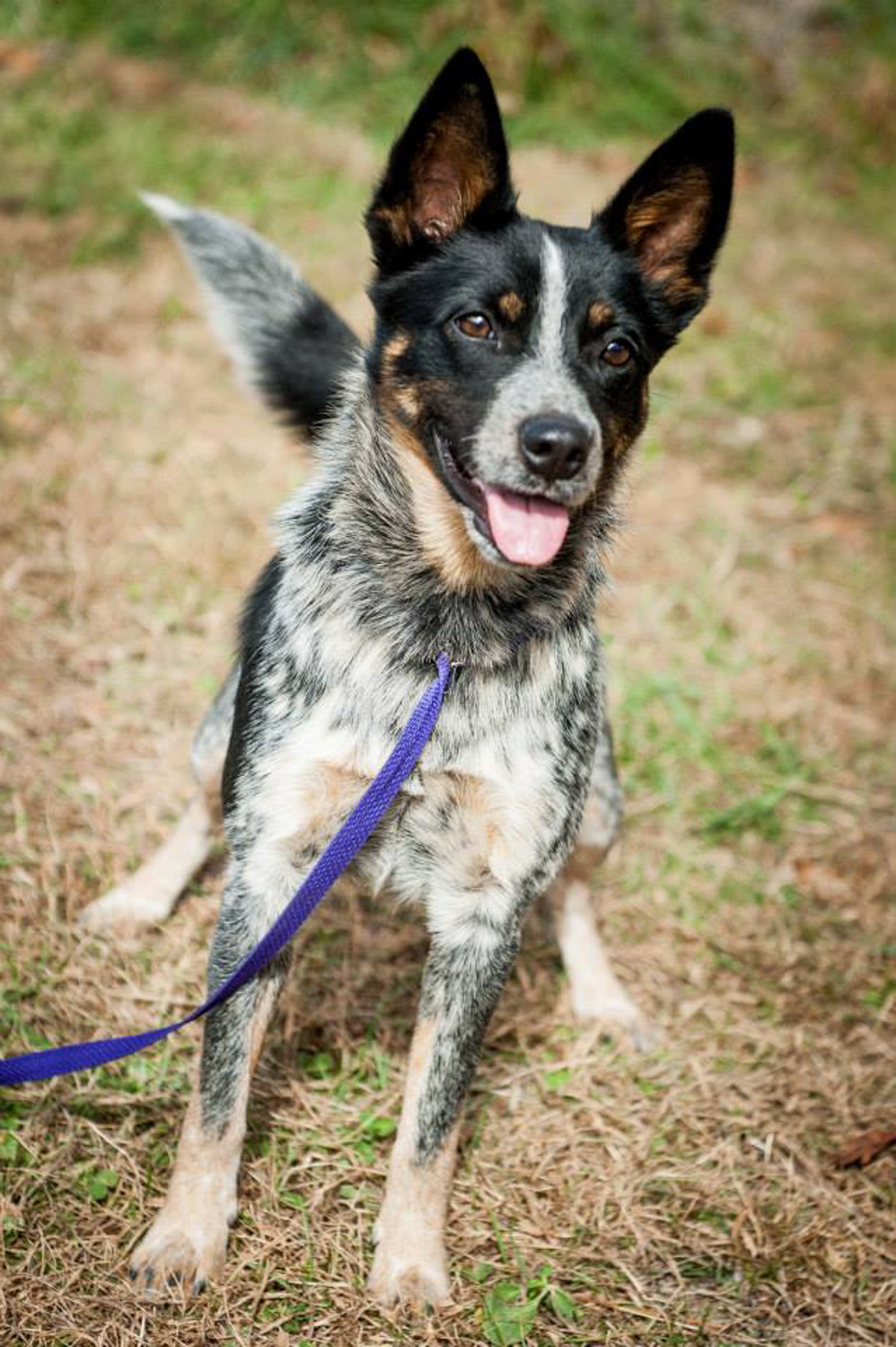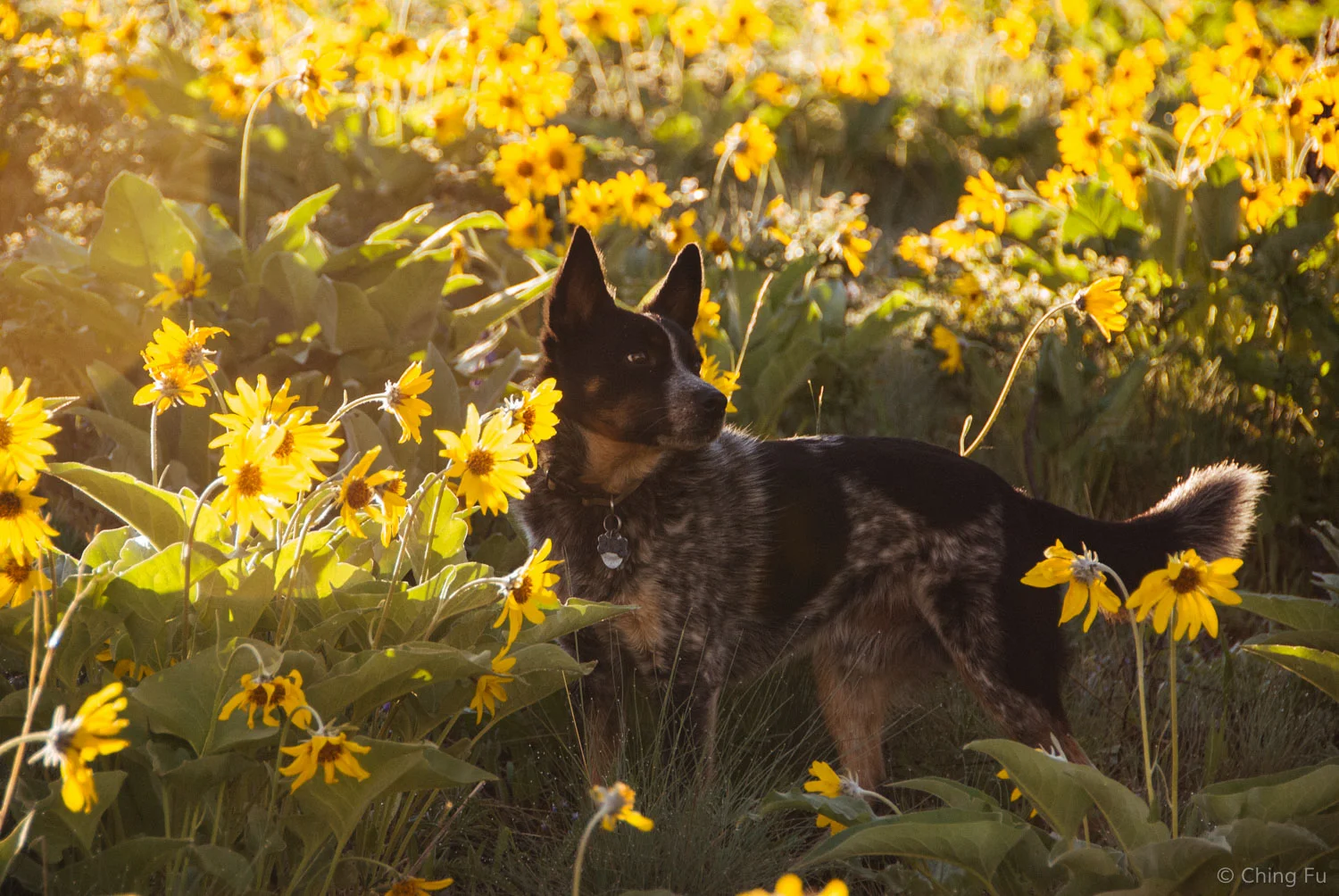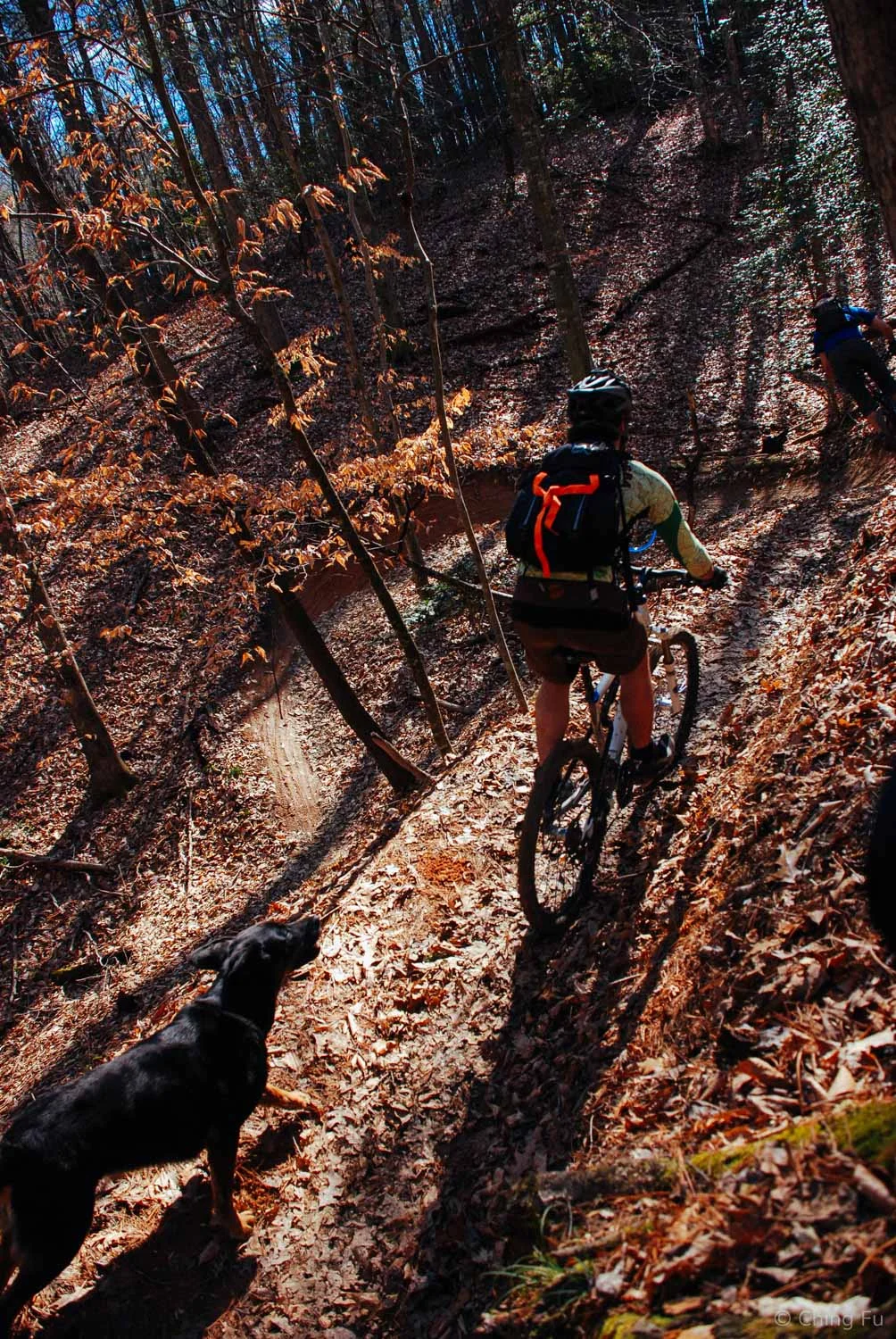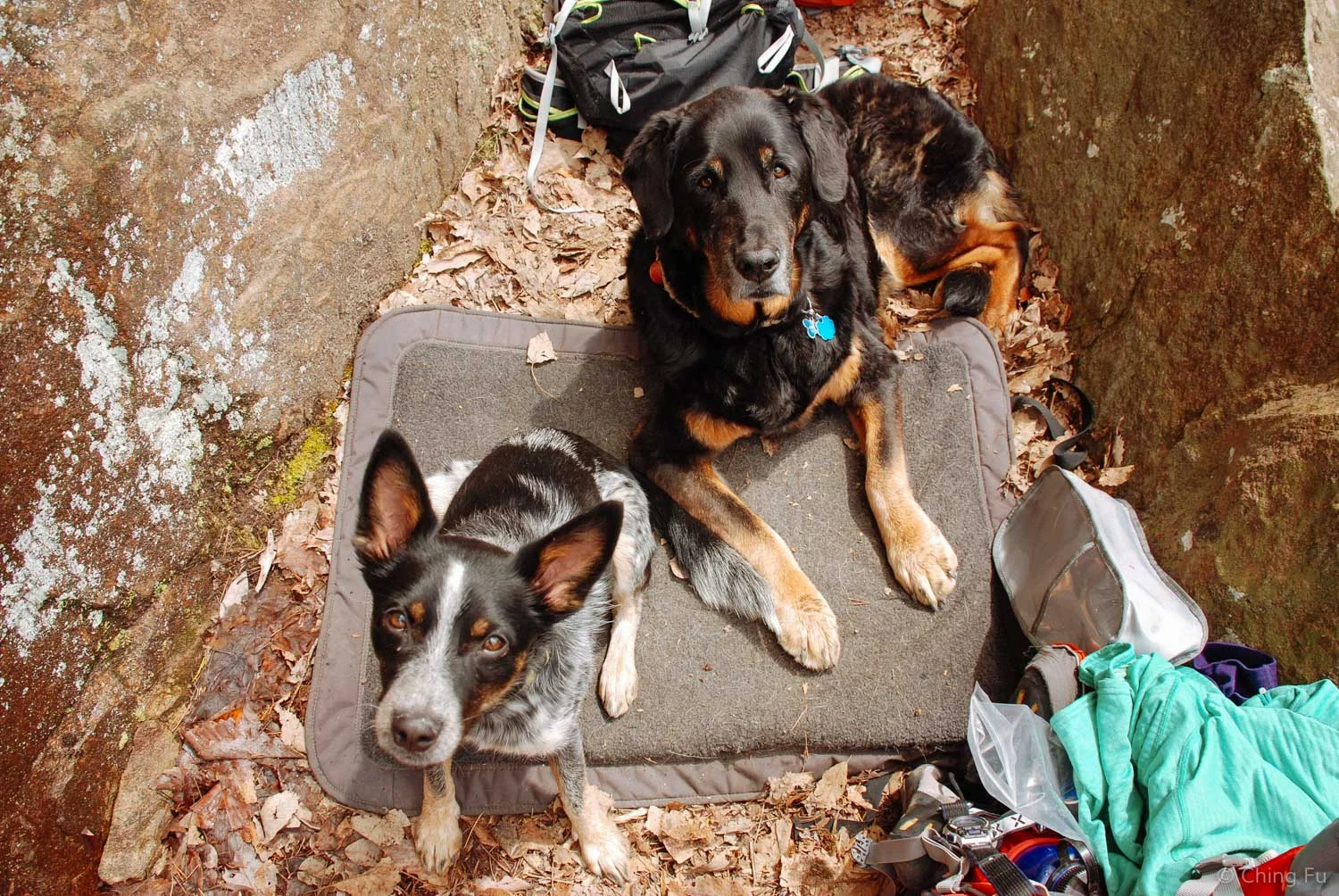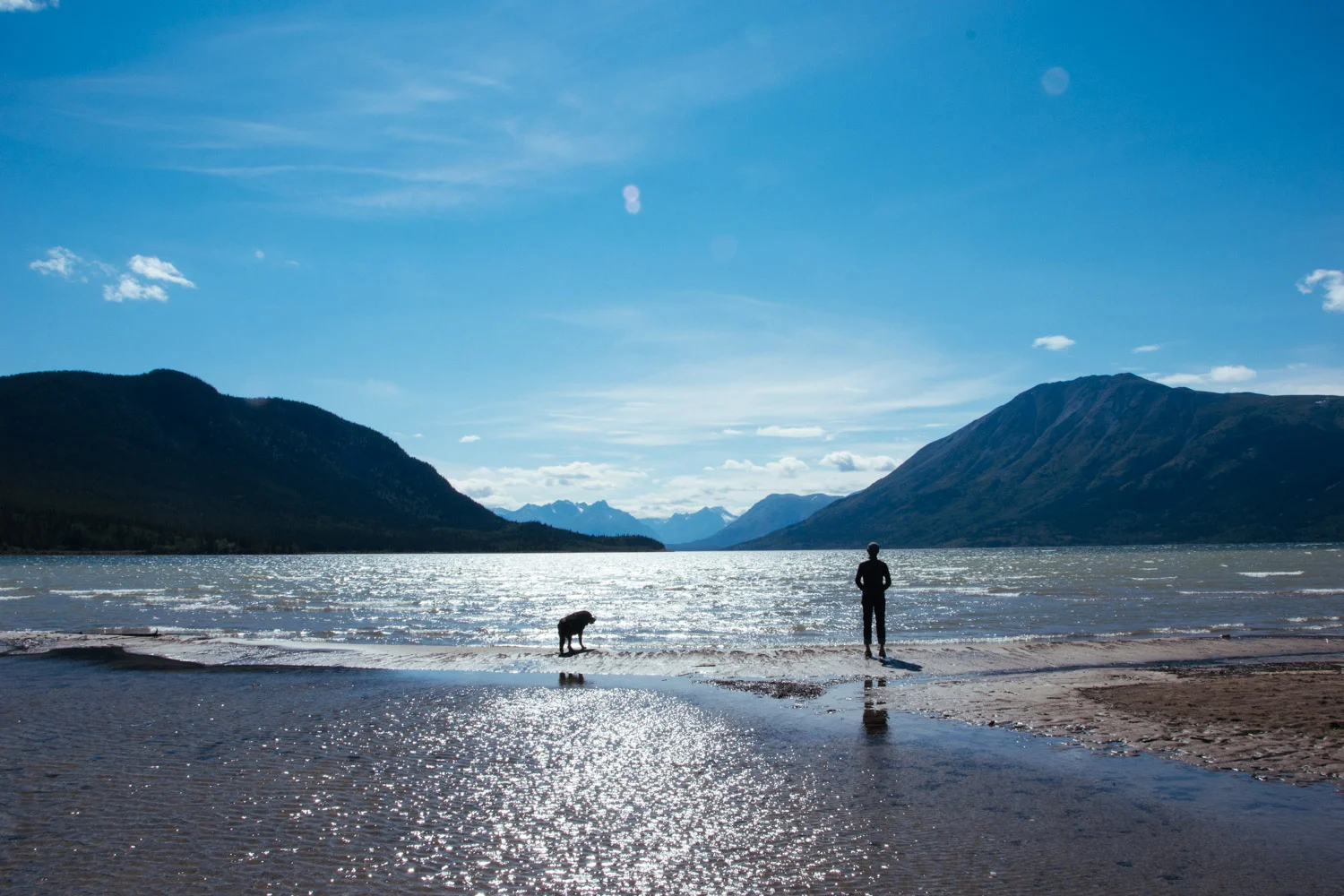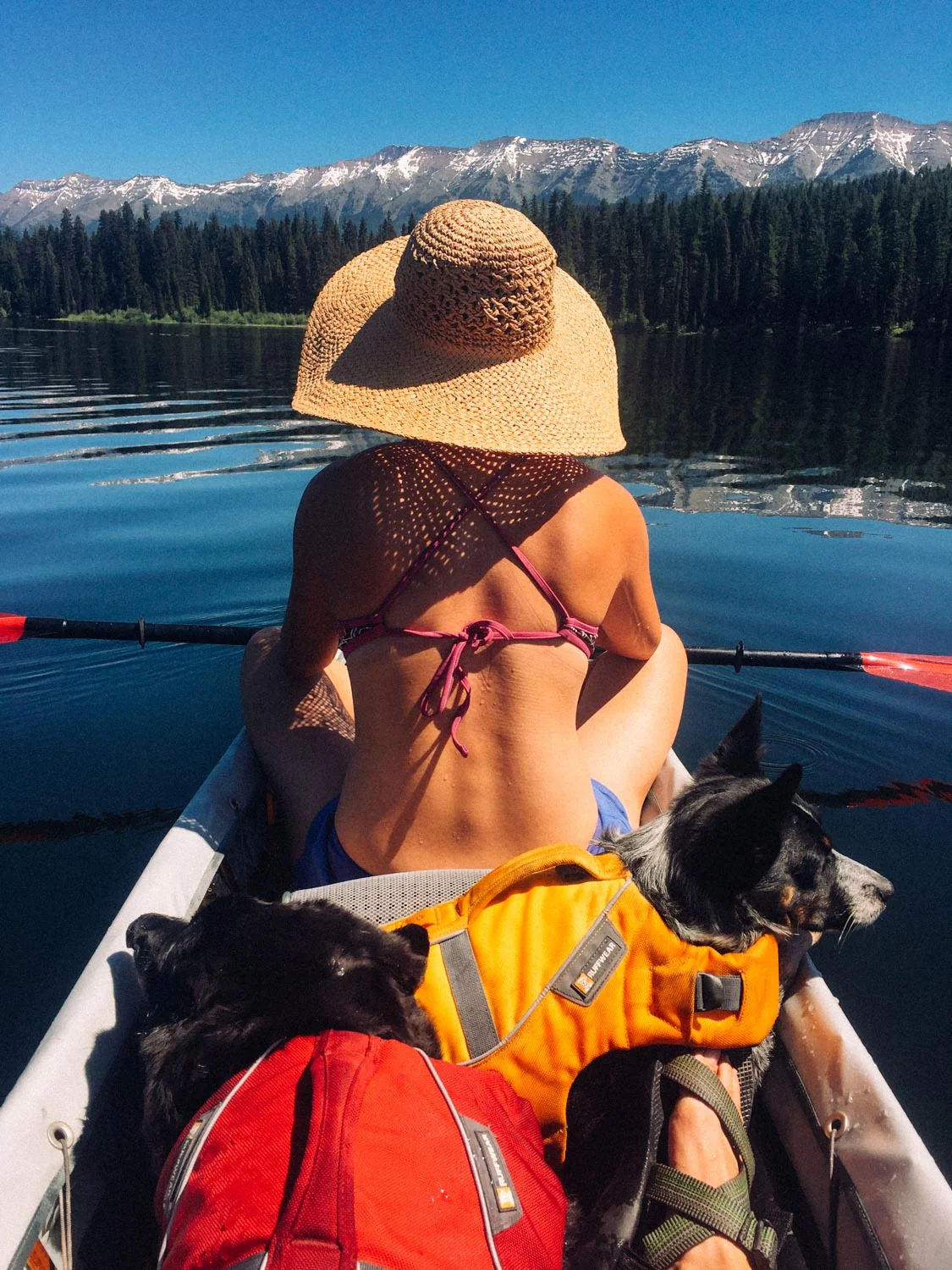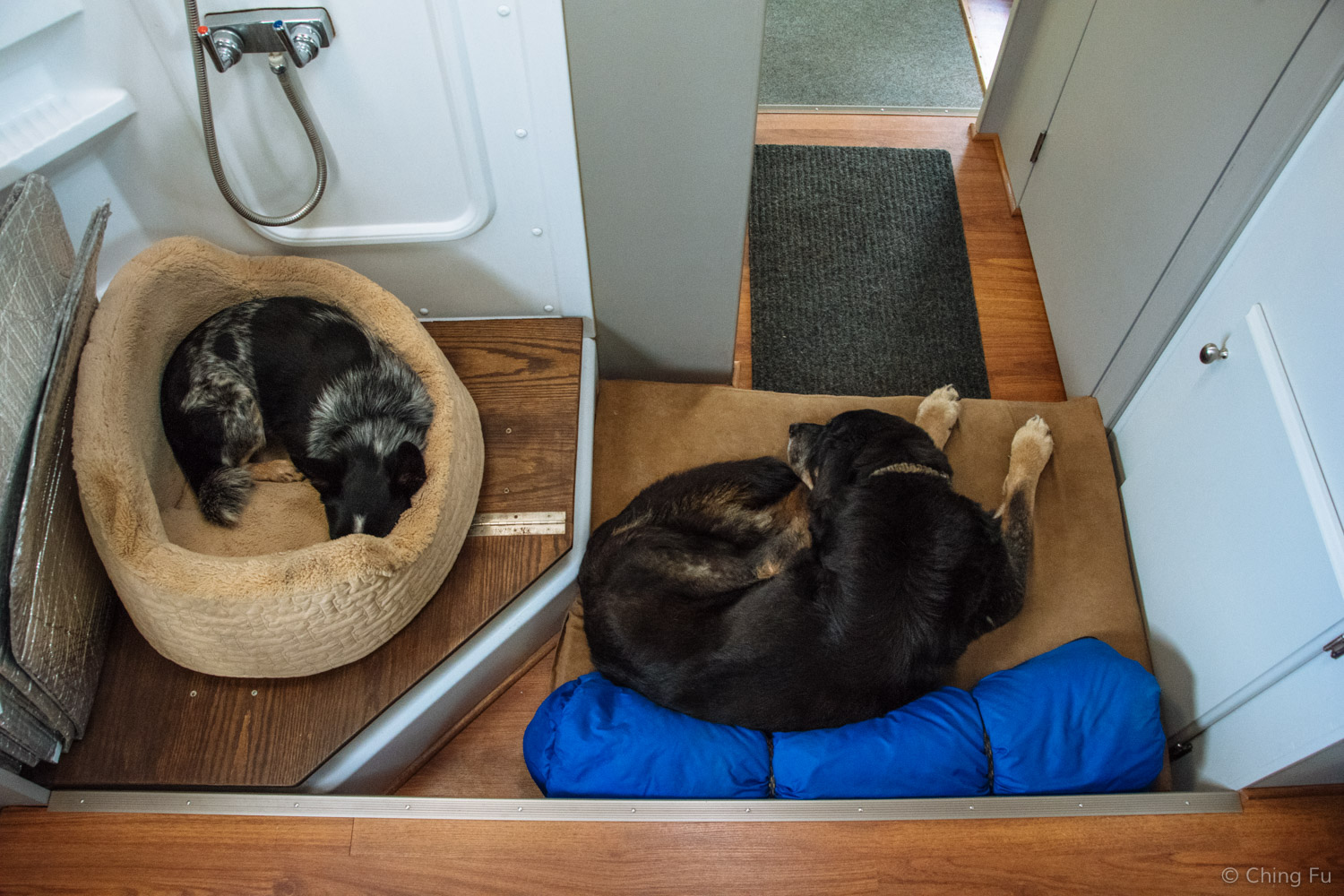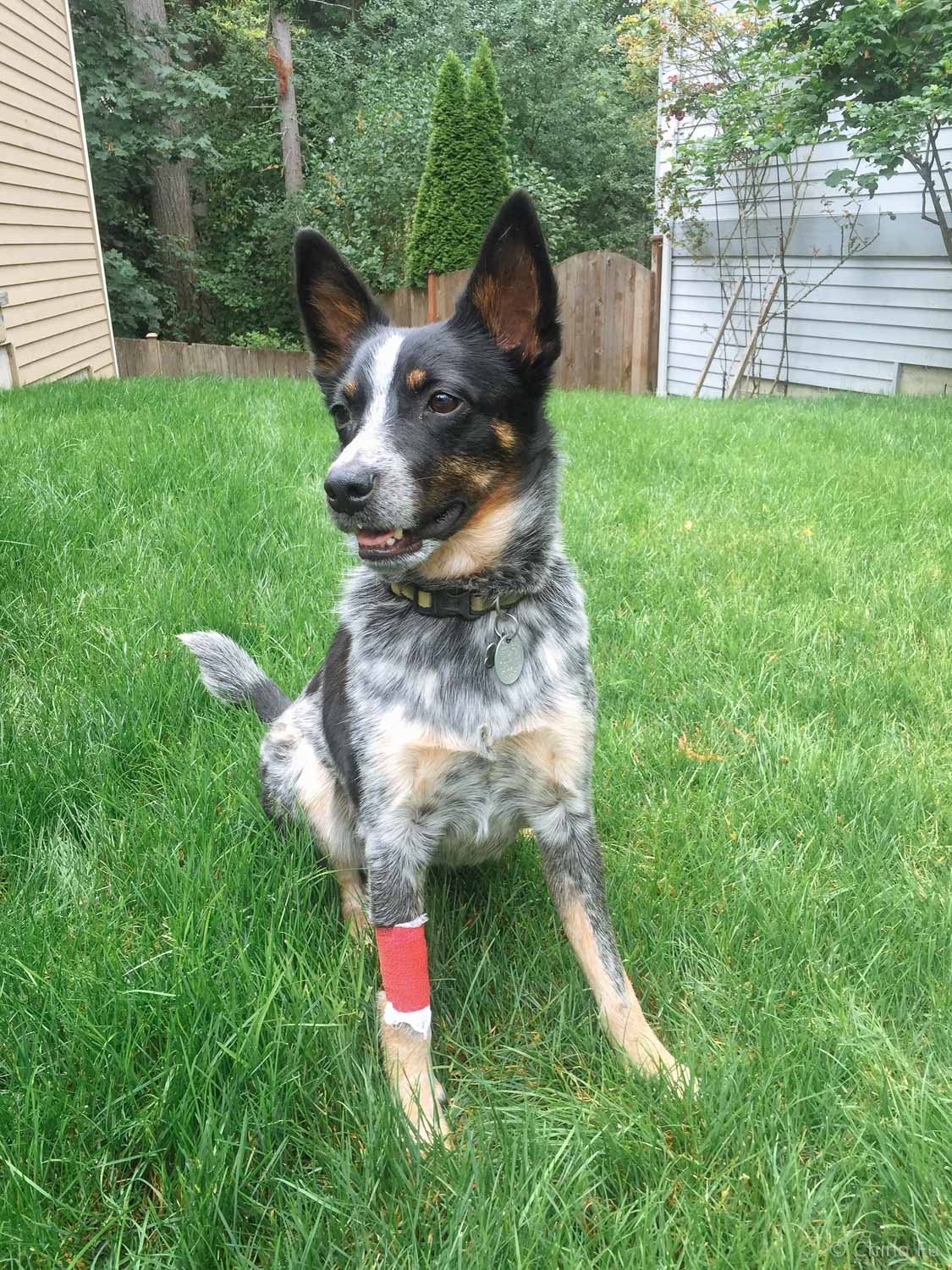Living On The Road With Dogs
Disclosure: This post contains Amazon affiliate links. As an Amazon Associate we earn a small commission at no additional cost to you. Please read our disclaimer.
Originally posted July 13, 2016
Living on the road with Tybee and Tyki is pretty much as easy as it was in a house. But there are few things that makes it difficult at times. Read on to find out what they are.
Tyki (Tee-kee)
We officially adopted Tyki in December 2013 after fostering him for a month from Brother Wolf Animal Rescue. Honestly, it was the worst time to adopt a dog, especially a very high-energy blue heeler mix.
Tyki's adoption photo. Look at those ears!
We started working on the RV that same month and it pretty much consumed every free moment we had. This meant that we couldn't really set aside as much time as we wanted to and should have to train and exercise Tyki. He got daily walks and we brought him hiking, mountain biking, paddling and climbing whenever we had the time to go. And since the RV storage unit was in was fenced-in, Tyki had the run of the whole place while we were working on it. While we paid attention to him, took care of him and loved him, we didn’t realize he had anxiety issues.
Taking a break from working on the Toaster to play with Tyki at the storage unit.
Those issues became apparent once we got on the road. Out of all of us, he had the hardest time adjusting to the new lifestyle. Our first stop was Kansas City to visit our friend Chad who loves dogs and really liked Tyki. A total surprise to us, Tyki not only didn’t reciprocate any positive feelings. Whenever Chad would try to pet him, Tyki got aggressive and tried to bite him. This happened with our other friend, Jay, who we visited in Colorado. This really caught us off guard because he was never aggressive to any of our friends, male or female, back in Asheville. It got worse during the first few months we were on the road. Anyone who would come near us or even the truck, he would try to attack them and acted like he was a rabid dog (ok, maybe not that bad). We were really worried and ended up getting back in touch with a dog trainer that we had met with a couple of times about Tyki before leaving Asheville.
He's such a wonderful dog despite his anxiety issues.
It was from Jenny that we learned that Tyki is a fearful dog. His aggression came out potentially because of two reasons: 1) He was with us long enough that he felt confident enough to express how he truly felt; 2) The lack of structure and extreme changes to his life were very stressful for him. Also, we didn’t know his history, aside from that he was found on the streets. We don’t know what happened to him during the first year or so of his life before we adopted him. But we do know that when we first fostered him, he was scared of cars driving by, walking through doorways, and always flinched when petted on the top of his head.
We’ve been spoiled with Tybee, who I adopted as a puppy and is extremely laid back and loves everyone. Jerud and I had to learn how to help Tyki feel more confident and comfortable in general and especially around strangers. It’s still a work in progress, but he’s gotten a lot better.
Here are the things we found that really help:
Now that we know Tyki isn’t a fan of strangers, especially men, we give everyone a heads up about him. He’s adorable and looks like a puppy so everyone wants to pet him. We ask people not to and instead to let him come to them. Even then, we tell them to not make eye contact, don’t pet him on top of his head, and keep the interaction short. He gets overwhelmed easily.
We treat him with food whenever there are strangers around and he’s not barking or growling. This teaches him that good things happen to him when strangers are around and he’s behaving well. We’ve learned that giving strangers a treat to give to him is not good because that puts Tyki in a conflicting position: he wants the food, but he’s scared of the stranger. The food coming from us and eventually from the new person (after we’ve been hanging out for awhile) is the best way to approach it.
We use the same treat approach when strangers come to the truck or RV.
We do our best to keep him away from crowds and loud noises because that combination stresses him out.
The truck is Tyki’s safe zone. If a door is open he’ll jump in it to hang out and sleep. I think it may be like an oversized crate for him (which he had when we were living in a house, but didn’t like because we used it when we had to leave him home alone). Now when he asks to go in it because he’s tired of the crowd around him or he’s tired of playing with a dog, we oblige.
Tyki and his love, the truck.
Teaching him tricks (using the clicker) has helped. Now that he knows commands, we can help him figure out what to do when he’s stressed, overwhelmed and just isn’t sure how to act.
Maybe none of this behavior and fear would've come out if we stayed living in Asheville and kept a routine. Maybe living on the road didn’t cause any of his issues, but it definitely exacerbated things for him. Either way, we think life on the road is overall great for him. I’ll go into that in a bit.
Oh and in case you were wondering, we didn’t purposely name Tyki to be so similar to Tybee. He came with that name and we felt that it fit him well.
Tybee (Tĭ-bee)
As I mentioned earlier, Tybee is a super chill and sweet dog. It helps that Tybee and I have been together since she was 8 weeks old. But it’s also just her Labrador personality. She’s the one I introduce to kids who want to pet one of the dogs.
A few days after I adopted Tybee.
Despite my urgency to get on the road while Tybee was in good shape and health, we didn’t actually move into the RV until she was 11 years old. That’s one thing I wish I could change: live on the road during her younger years when she was still capable of hiking, swimming, and mountain biking like she used to be. Sadly, she was already dealing with a bad case of arthritis and potentially a spinal disease call myelopathy before we left Asheville. While in Asheville, Tybee retired from mountain biking and picked up paddleboarding. She also had to decrease the mileage she could hike from all day long to 5 miles to 3 miles. Now it's just a couple hundred feet.
She loved mountain biking.
During our first several months on the road things were fine and overall easy with her. We brought her to check out new short trails, towed her in her bike trailer, and let her go swim and play splash in lakes and rivers. But then August 2015 hit and she was having pee issues. The symptoms that she displayed made me think maybe it was early stages of incontinence. But when I brought her to the vet I found out that she had a UTI. Phew, give her some antibiotics and things will get better, I thought. It did for a couple of months and then it got bad again, then worse, and then terrible. We kept going to the vet, getting tested, having X-rays done in case she had a stone, all the while receiving different kinds of antibiotics. But her UTI kept coming back. During that time she could hold her pee for 6 hours, 4 hours, and then at its worst, 1 – 2 hours. We had to adjust the trails we went hiking and mountain biking on to make sure that we got back in time to pee her. We took turns during the night getting up to walk her because she couldn’t hold it for that long. It was mentally, physically and emotionally exhausting.
But she still gets to go on bike rides.
It was hard, but living on the road actually made it a little bit more bearable because now our schedule was flexible. We didn’t have to be at work early in the morning and we didn’t have to both be gone for 9 hours straight. But what made it really difficult was that we were living in an RV dealing with all this. No longer did we have a washer and dryer that we could’ve easily tossed soiled things into. I hand washed pee covered dog bedcovers. We also didn’t have a bathtub that I could wash her in. We used the outside shower when the weather allowed it, or a plastic tub filled with water outside, or the RV shower. But all this washing used more water than usual, which made our fresh water tank seem even smaller than it already was. This all also made the Toaster feel a lot smaller and tighter. It always smelled like pee inside the RV because she constantly had accidents. Worse was that she was miserable. Tybee felt absolutely terrible about peeing and pooping on her bed. She’s had fecal incontinence for a few years now, but it’s progressively gotten worse and now it’s totally unpredictable. The few times she had bad diarrhea in the truck and RV was terrible for everyone. We started using puppy pads regularly, which helped with the dirty bedcover issue, but we felt terrible about the waste it produced, along with all the paper towels we had to use to clean everything up. Going over to people’s houses was really stressful, especially if they had carpet, or if we were having dinner because Tybee has this ability to poop while we were eating.
The other negative things about living on the road with an aging dog that needs to go to the vet all the time is that we don’t ever go to the same vet. So, I get asked over and over what I’m doing about her arthritis (the answer is, “Everything!”) and the last few times it was the whole “Is It Time” conversation. The worst was when the vet decided within 5 minutes of meeting us that it was appropriate to bring it up and tell me that if I decided to put her down now he would support me. Thanks asshole, but you don’t know anything about her and we came in for a UTI follow up test. That specific incident was seven months ago.
She enjoys her time floating on any lakes.
But the dark times are finally over. Her last and worst pee period turned out not to be another UTI (we were ALL shocked, including the vet) and she’s now on Proin (a medicine for incontinence) and thanks to it, she can hold her pee for up to 6 hours! She still randomly poops, but as long as they are solid turds, we can deal.
Life is hard with an aging dog. At times it’s potentially harder when living in an RV. But there are also good things about living the nomadic life with dogs – even if they are old, or neurotic.
Tyki and Tybee chilling while we were rock climbing in TN a few years ago.
The Pros Of Life On The Road With Dogs
We get to spend a lot more time with them. This is especially important to us because our time with Tybee is limited.
Tybee and me enjoying the view at Bennett Lake in Carcross, Yukon.
We didn’t have to leave Tybee alone for 8 hours during her UTI period or hire someone to come care for her while we were at work.
Traveling to new places makes them both really happy. Tybee loves watching the scenery go by from inside the truck. She stays awake and alert during our travel days and then crashes out when she’s back in the RV. Tyki gets to spend more time with his truck and constantly has new places to roam around in.
We stay mainly on BLM and national forest land so that means Tyki get to explore and be stimulated by nature. This is great because he doesn’t like dog parks. Tybee also loves to lay outside, sniff the air and watch everything around her. She finds it way more interesting than our backyard.
Enjoying the easy dog life.
There’s more time and opportunities for us to hike and mountain bike - which means Tyki gets to hike and ride more. As they say, “A tired dog is a good dog.”
Riding Montana Mountain in Carcross, Yukon. Photo by Jason Liske.
Tybee gets to visit all kinds of lakes and rivers, and paddle/float more. She’s gotten to drink out of the alpine lakes, the Pacific ocean, glacier fed rivers, and mountain springs.
The Toaster is small so Tybee can lay anywhere inside and see what we’re always doing. Unlike in our house she would follow us room to room to make sure she wasn’t missing out on anything.
We don't need as many rugs to cover the wood floor in the RV to prevent Tybee from sliding and falling.
Tyki typically gets free first visits to vets because they are always the first visit at that particular vet!
Dogs are welcomed in Canadian national parks! Sadly, they only get to hike the boring (paved) hikes in U.S. national parks.
Tips Living On The Road With Dogs
Obviously this will vary depending on your own dog, but here are some general tips:
Having a well-trained dog will make such a big difference when it comes to traveling to different environments.
Specifically having a dog that responds well to recall commands. If you plan to do outdoor activities with your dogs or let them roam around camp, it’s extremely important that they have good recall skills. This is not only crucial to their own safety, but it’s also respectful to whoever might be around you.
If you spend a lot of time in nature with your dog off the leash, another important command they should know well is “leave it”. There's a lot of sensitive local wildlife, like certain birds that nest on the ground or baby rabbits that your dog can hurt.
Keep a leash nearby/on hand at all times. We don’t like to hike with Tybee or Tyki on leashes. But we are respectful to the fact that we may come across other hikers that are scared of dogs or have dogs that don’t play well with other dogs. We put our dogs on a leash when we see other hikers, or ask them first if they (and their dogs) are ok with dogs.
Provide your dog with his/her own space in the RV (and tow vehicle). Tybee and Tyki each have their own beds in the Toaster and in the truck. It’s important and comforting for them to know that they have their own space. I’ve actually come across people who in the process of rebuilding their rig, built in a dog crate.
Tyki and Tybee's spots in the Toaster.
If you have a dog that needs to visit the vet more than twice a year, having one of the Banfield Pet Hospital wellness plans will save you money in the long run. There are Banfield vets in almost every mid-sized city. This is what I have for Tybee.
Know that your dog may have to go through a transitional period just like you do when first moving into an RV and hitting the road. Help them adjust by paying attention to their needs and finding ways to relieve fears they may have. Reassurance and calmness from you is always much more effective than anger and punishment, especially during these times.
Find out what the local hazards are for dogs in whatever area you’re staying. We’ve had to keep Tybee and Tyki out of lakes because of toxic blue-green algae (cyanobacteria) issues, make sure they don’t stick their faces in certain weeds (ex: foxtail grass) that can cause harm to them, and that they stay away from snakes.
Tyki spent a night at the vet because he got into something in the woods that made him really sick.
If you plan to be in an area for long that has poisonous snakes, look into bringing your dog to a (rattle)snake avoidance training class. These are actually kind of hard to find – we’re still looking for one in fact – so if you do come across a class, don’t miss the opportunity!
Keep an extra meal and water on-hand in your vehicle at all times so your dog can always have her dinners on time, especially on travel days, and she can always stay hydrated.
If your dog has occasional pee accidents or incontinence dribbles, this washable pee pad is a good alternative to disposable puppy pads. We use this on our bed and on my aunt's living room carpet to protect from Tybee leaks.

